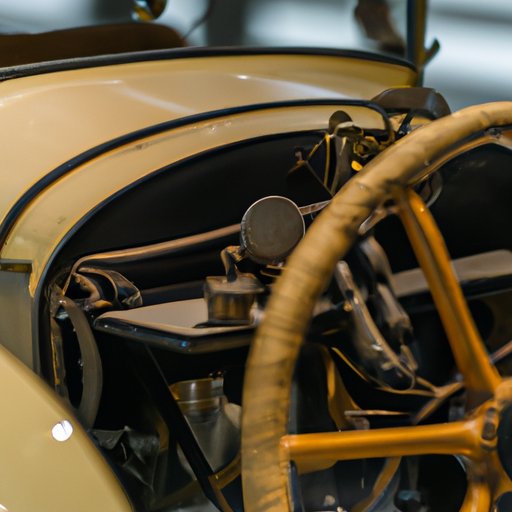Introduction
The automobile is one of the most revolutionary inventions of all time. It has transformed transportation, industry, and society in ways that were unimaginable prior to its invention. But when exactly was the car invented? This article takes a look at the history of the automobile and the key innovations that led to its development.

A Historical Look at the Invention of the Automobile
The concept of the automobile dates back to the 1600s with the invention of the steam engine. Early developments in this area included Nicolas-Joseph Cugnot’s 1769 “fardier à vapeur” (steam dray) and Richard Trevithick’s 1801 “Puffing Devil” locomotive. However, these machines lacked steering systems, making them difficult to maneuver. Key innovations such as the four-stroke internal combustion engine, differential gears, and electric ignition paved the way for the first gasoline-powered cars in the late 19th century.

A Timeline of Car Evolution
The first self-propelled vehicles appeared in the 19th century. In 1806, Swiss inventor François Isaac de Rivaz built an experimental vehicle powered by an internal combustion engine fueled by hydrogen. In 1885, German engineers Karl Benz and Gottlieb Daimler developed their own gasoline-powered engines. They went on to found two of the earliest car companies – Mercedes-Benz and Daimler-Motoren-Gesellschaft (DMG).
In the early 20th century, automobile production began to take off. In 1908, Henry Ford introduced the Model T, a mass-produced car designed for the average consumer. The introduction of the assembly line allowed Ford to produce cars more quickly and efficiently than ever before. This sparked a surge in car ownership and the growth of a new industry.

The Pioneers of Automotive Technology
Karl Benz and Gottlieb Daimler are widely credited with inventing the first gasoline-powered cars. Benz was a German mechanical engineer who patented the three-wheeled Motorwagen in 1886. He later founded the company that would become Mercedes-Benz. Daimler was another German engineer who worked with Benz and is known for his advances in engine design. He founded DMG in 1890.
Henry Ford was an American industrialist who revolutionized automobile production. He is best known for introducing the Model T in 1908, which was the first mass-produced car. Ford’s use of the assembly line allowed him to produce cars more quickly and efficiently than ever before, sparking a surge in car ownership.
How the Automobile Changed the World
The invention of the automobile had an immense impact on industry and society. On the industrial side, it spurred growth in related industries such as oil, rubber, steel, and glass. These industries created jobs and generated wealth, helping to fuel economic growth. On the social side, the car enabled people to travel greater distances, leading to increased mobility and freedom.
The automobile also changed the way people lived. For example, suburbs began to spring up around cities as people moved away from urban centers. This led to a decline in public transportation and an increase in car ownership. Cars also became a symbol of status and wealth, and they continue to be seen as a sign of success today.
The Inventors Who Revolutionized Transportation
The invention of the automobile was just the beginning of a long journey of automotive innovation. Rudolf Diesel, Ferdinand Porsche, and Charles Kettering were among the many inventors who revolutionized transportation. Diesel invented the diesel engine in 1893, while Porsche is credited with developing the first hybrid electric car in 1900. Kettering invented the first electric starter in 1912, which made it easier to start cars without using a hand crank.
Conclusion
The invention of the automobile has changed the world in countless ways. From Karl Benz and Gottlieb Daimler to Henry Ford and Rudolf Diesel, there have been many innovators who have contributed to the development of the car. The automobile has transformed industry and society, making it possible for people to travel farther and faster than ever before. As we look to the future, we can only imagine what new automotive technologies will emerge.
Summary
This article explored the history of the car and the key innovations that led to its development. It looked at a timeline of car evolution, from early steam engines to mass-produced cars, and examined the pioneers of automotive technology, such as Karl Benz and Henry Ford. Lastly, it discussed how the automobile has changed the world and the inventors who revolutionized transportation.
Reflection
The invention of the automobile has had a profound effect on our world. From enabling people to travel farther and faster to changing the way we live and work, the car has reshaped society in innumerable ways. We owe a debt of gratitude to the visionaries who helped bring the automobile to life, and we can only imagine what the future holds for this revolutionary invention.
(Note: Is this article not meeting your expectations? Do you have knowledge or insights to share? Unlock new opportunities and expand your reach by joining our authors team. Click Registration to join us and share your expertise with our readers.)
